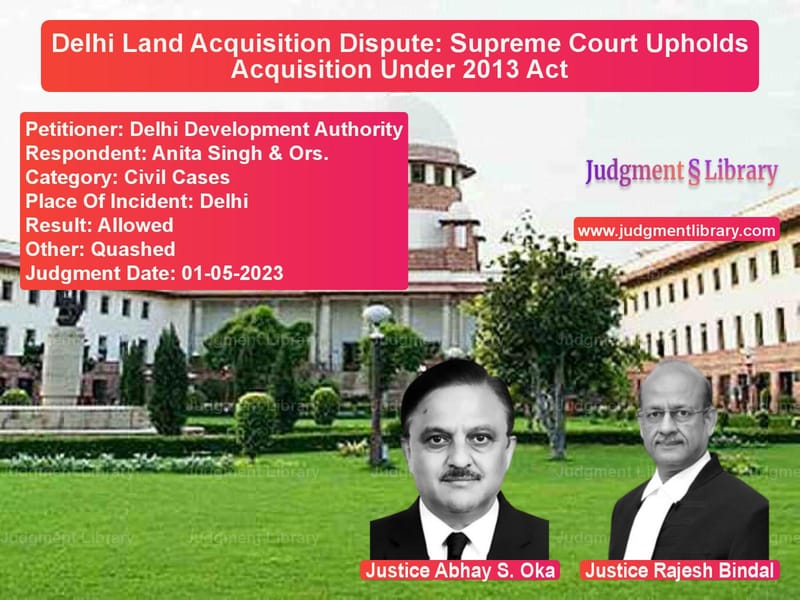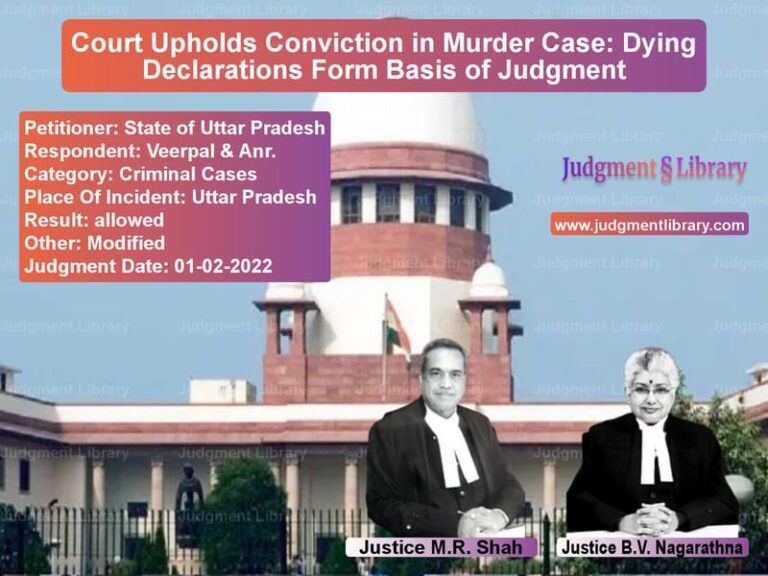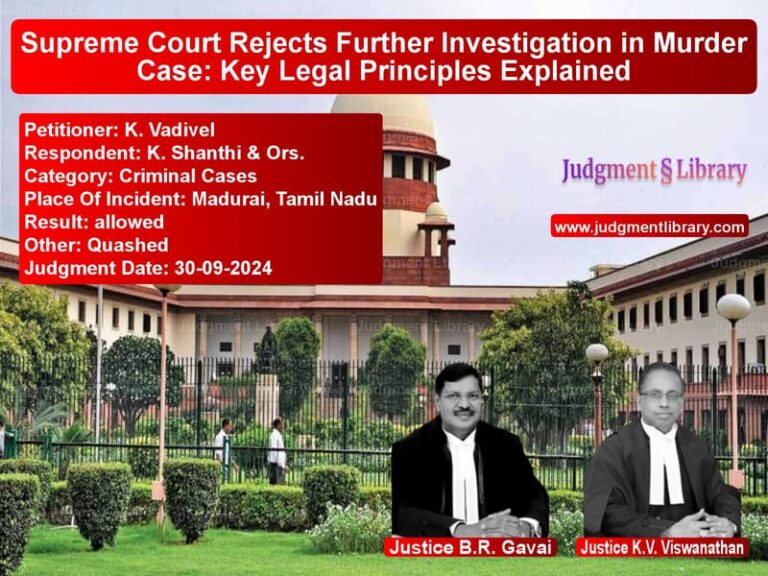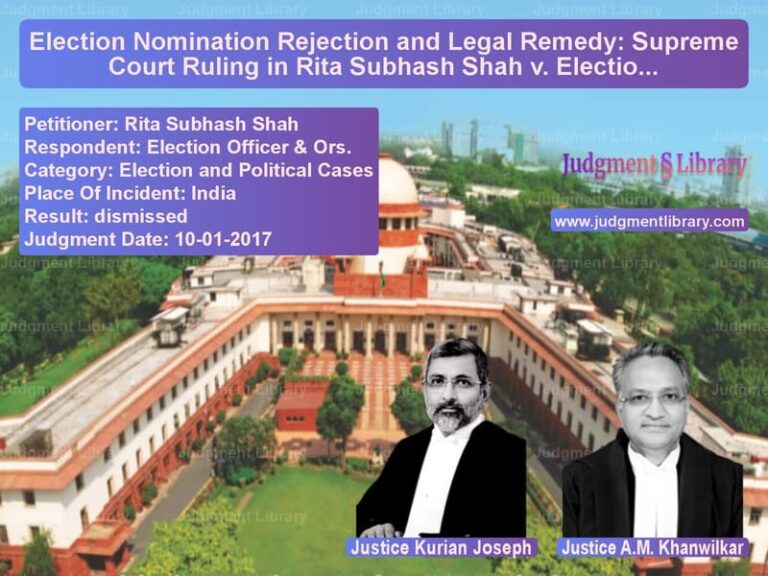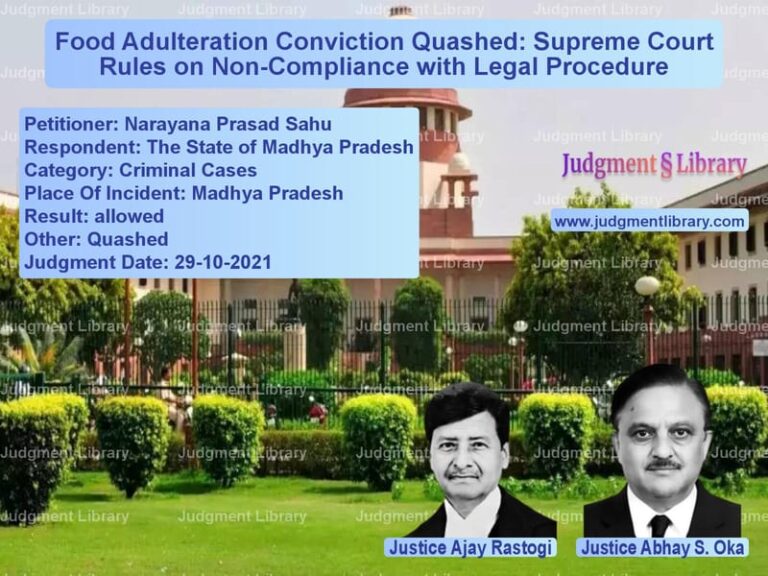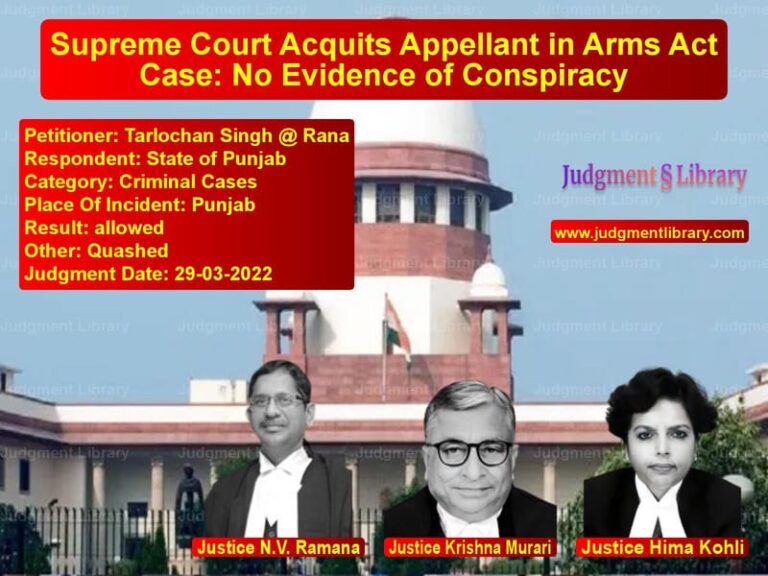Delhi Land Acquisition Dispute: Supreme Court Upholds Acquisition Under 2013 Act
The case of Delhi Development Authority v. Anita Singh & Ors. revolves around the contentious issue of land acquisition under the Right to Fair Compensation and Transparency in Land Acquisition, Rehabilitation and Resettlement Act, 2013 (2013 Act). The Supreme Court was called upon to determine whether the land acquisition process had lapsed under Section 24(2) of the 2013 Act due to alleged non-payment of compensation and lack of possession by the government.
This case is significant as it clarifies the legal principles surrounding land acquisition, compensation deposits, and the conditions under which acquisitions can be challenged under the new law.
Background of the Case
The dispute arose when Anita Singh, the respondent, filed a writ petition before the Delhi High Court, invoking Section 24(2) of the 2013 Act. She contended that the land acquisition process had lapsed because:
- The Delhi Development Authority (DDA) had not taken possession of the land.
- She had not received compensation.
The land in question, measuring 100 square yards in Village Dichaun Kalan, Delhi, was acquired through notifications issued under the Land Acquisition Act, 1894. The key timeline of the acquisition process was:
- April 7, 2006: Notification under Section 4 of the 1894 Act was issued.
- April 4, 2007: Declaration under Section 6 was made.
- December 30, 2008: Land Acquisition Collector passed the Award under Section 11.
- February 10, 2012: Government claimed possession of most of the land except a portion with structures.
- December 27, 2013: Due to a dispute over ownership, the compensation was deposited in the Reference Court.
The Delhi High Court ruled in favor of the respondent, holding that the acquisition had lapsed under Section 24(2) of the 2013 Act, as compensation had not been paid directly to the landowner. The DDA, dissatisfied with this ruling, appealed to the Supreme Court.
Petitioner’s Arguments
The Delhi Development Authority (DDA), represented by its legal counsel, argued:
- The acquisition had not lapsed because the government had taken possession of the land.
- As per the Supreme Court’s ruling in Indore Development Authority v. Manoharlal, compliance with either possession or payment of compensation is sufficient to sustain the acquisition.
- The respondent was not the recorded owner at the time of acquisition, and therefore, compensation was deposited with the Reference Court as per Section 30/31 of the 1894 Act.
- The land was earmarked for a crucial infrastructure project (UER-II) connecting major highways, which was essential for decongesting Delhi.
Respondent’s Arguments
The respondent, Anita Singh, countered:
- She had purchased the land via a sale deed in 2005 and was entitled to compensation.
- Neither compensation was paid to her nor was possession taken, thereby rendering the acquisition void under the 2013 Act.
- The High Court correctly applied the principles laid down in Pune Municipal Corporation v. Misirimal Solanki, which held that failure to pay compensation led to lapsing of acquisition.
Supreme Court Judgment
The case was heard by Justice Abhay S. Oka and Justice Rajesh Bindal. The Supreme Court examined the key legal principles governing land acquisition under the 2013 Act and overruled the Delhi High Court’s decision.
1. Compliance with Either Possession or Payment
The Court relied on the Indore Development Authority ruling, stating:
“Compliance of either of the two conditions, i.e., taking over possession of the land or payment of compensation, is sufficient to sustain the acquisition.”
Since possession of most of the land was taken and compensation was deposited in the Reference Court, the acquisition remained valid.
2. Compensation Deposit as Valid Payment
The Court rejected the argument that failure to pay compensation directly to the landowner results in automatic lapse:
“If compensation is deposited in the Reference Court due to ownership disputes, it constitutes a valid tender of compensation.”
Since the respondent was not the recorded owner at the time of acquisition, the government was justified in depositing the amount with the Reference Court.
3. Public Interest in Infrastructure Projects
The Court took into account the public interest involved in the project:
“The land is required for UER-II, which connects NH-1, NH-10, and NH-8 to NH-2. This project is crucial for reducing congestion in Delhi.”
The Court ruled that infrastructure projects should not be stalled due to baseless claims.
4. Reaffirming Land Acquisition Principles
The judgment clarified that once land is acquired and vested with the government, it cannot be reclaimed:
“Once possession has been taken under Section 16 of the 1894 Act, the land vests in the State free from all encumbrances. Any claim made thereafter is of a trespasser.”
This principle reaffirmed that claimants cannot challenge acquisition after the process is complete.
Final Verdict
The Supreme Court allowed the appeal and ruled:
- The land acquisition had not lapsed under Section 24(2) of the 2013 Act.
- Depositing compensation in the Reference Court constituted valid payment.
- The respondent had no legal claim since she was not the recorded owner at the time of acquisition.
- The project for public infrastructure must proceed without further delay.
Conclusion
This judgment reinforces the principle that land acquisition cannot be overturned based on procedural technicalities. It upholds the government’s right to acquire land for public use while ensuring compliance with the legal framework. By settling the interpretation of Section 24(2) of the 2013 Act, the Supreme Court provides clarity on how compensation and possession determine the validity of acquisitions.
Petitioner Name: Delhi Development Authority.Respondent Name: Anita Singh & Ors..Judgment By: Justice Abhay S. Oka, Justice Rajesh Bindal.Place Of Incident: Delhi.Judgment Date: 01-05-2023.
Don’t miss out on the full details! Download the complete judgment in PDF format below and gain valuable insights instantly!
Download Judgment: delhi-development-au-vs-anita-singh-&-ors.-supreme-court-of-india-judgment-dated-01-05-2023.pdf
Directly Download Judgment: Directly download this Judgment
See all petitions in Property Disputes
See all petitions in Damages and Compensation
See all petitions in Judgment by Abhay S. Oka
See all petitions in Judgment by Rajesh Bindal
See all petitions in allowed
See all petitions in Quashed
See all petitions in supreme court of India judgments May 2023
See all petitions in 2023 judgments
See all posts in Civil Cases Category
See all allowed petitions in Civil Cases Category
See all Dismissed petitions in Civil Cases Category
See all partially allowed petitions in Civil Cases Category

